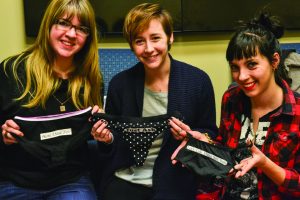By Valerie McMurray – [email protected] – Staff Writer

Photo by Brian Vu – Staff Photographer
The assumption that the risk of sexual assault is not present can actually increase that risk, said Anna Bauguess, case manager for the Student Health and Counseling Center.
“It’s very real and we don’t talk about it,” she said.
The Federal Bureau of Investigation estimates ninety percent of sexual assaults go unreported.
“Sex is really personal. There is an obscene amount of shame around it, but it’s not about sex – it’s about power,” Bauguess said.
Bauguess and Elizabeth Primero, the campus community director, said they plan to facilitate a free six-week Rape Aggression Defense course for women at the Sherrill Center. A basic self-defense class that emphasizes awareness and risk reduction, the course also ran last November and will run again after spring break.
“The word ‘rape’ in the class name is a big put-off to people. ‘That doesn’t happen here. That would never happen here.’ It does,” Bauguess said. “Being in the health and counseling center, it’s an every-other-day occurrence that someone reports they have had either a recent sexual trauma or it’s in their past. For about half my clients, it’s in their college-age years. It’s something we’re working on,”
On Jan. 21, an Asheville woman, 33, was attacked and raped by an unknown man near the corner of W.T. Weaver Boulevard and Barnard Ave. She was near her home shortly after midnight when her attacker pulled her hair, held her down, hit her and knocked her unconscious, according to the investigation report.
The location of the incident places it just 400 feet from the UNC Asheville campus, and both campus and Asheville police said they caution students not to walk alone at night.
At present, 23 registered sex offenders share a 28804 zip code, according to the official registry published by the North Carolina Department of Justice.
Detective Mandy Buchanan, a special victims unit investigator for the Asheville Police Department, said she could not recall any other incident of sexual assault taking place around W.T. Weaver Boulevard in the five years she has been at her post in the SVU.
Safety is assumed by many people, but information on how to be safe is not really taught, Bauguess said.
“I can’t think of anywhere that I think it would be safe to walk at night,” Buchanan said.
SPEAK Up, a student organization co-led by Janie Warstler and Peyton Kennedy, both juniors, provides education and support to students about sexual violence.
Their attention-grabbing, do-it-yourself, sexual consent-themed underwear were on sale Feb. 4 through 6 for $5 a pair in Highsmith Union. If anyone missed the sale, they can purchase a pair at this year’s performance of “The Vagina Monologues” on Feb. 15.
Some SPEAK Up members train in Crisis Response Outreach by Our VOICE, a sexual violence nonprofit organization located on Merrimon Avenue. SPEAK Up members said they hope their next big move could be an office space on campus where students can seek peer support.
“We try to dispel the myths in every workshop that we do,” Warstler said.
One thing SPEAK Up advocates and the RAD course educators said they agree on is, it is not about what the victim was wearing.
“We don’t like the mentality that it’s the potential victim’s responsibility for wearing what they want,” Warstler said.
Another important set of myths – men are always perpetrators and never victims – alienates men from the sexual violence conversation, according to faculty.
“Why is it assumed that men are naturally rapists and if we’re going to walk alone at night that we deserve it?” said Lori Horvitz, professor of literature and language, who, together with colleague Amanda Wray, organized campus events regarding sexual harassment for two years.
Campus safety measures are increasing. Recently, lights were installed on the path leading to the off-campus parking lot reserved for approved freshman vehicles, with a campus police call center and surveillance cameras soon to be added. Shuttle service has been expanded to evening hours, from 5:30 to 9:30 p.m., with routes running between campus and Harris Teeter, as well as to the Grove or Hawthorne Northside apartments, according to campus police.
Campus police said they strongly recommend students call for a campus police escort any time they feel at risk.
“That’s what we are here for,” said Eric Boyce, chief of police at UNCA. “Trust your instincts.”
Bauguess said she wants to tell people who walk with headphones to take at least one earbud out when they are out by themselves.
“All I want to do is provide options. You are responsible for your own safety. It’s a personal choice: Do I want to wear headphones and deal with whatever happens, or do I want to be more aware? I’m not talking about hypervigilance, just awareness,” Bauguess said. “People are more vulnerable in a setting where they’re more


















